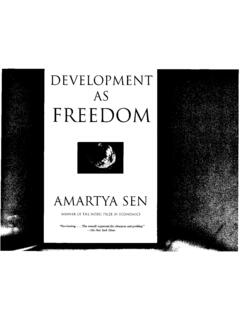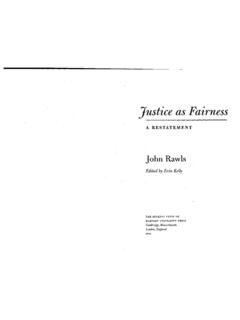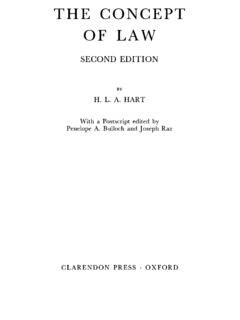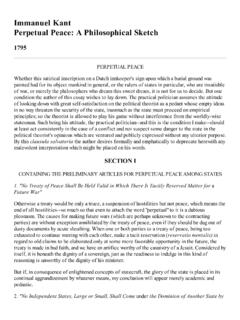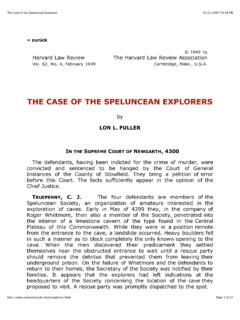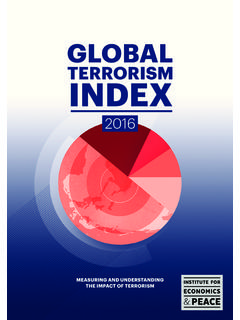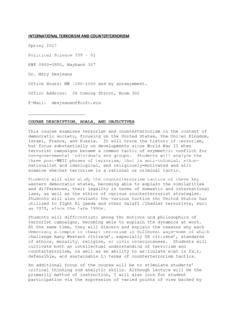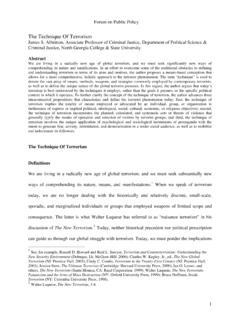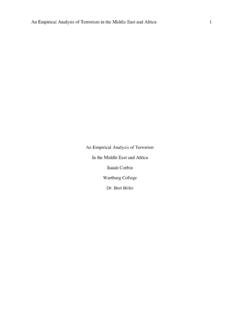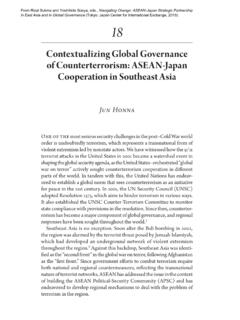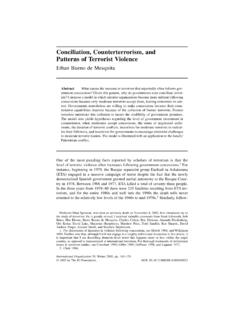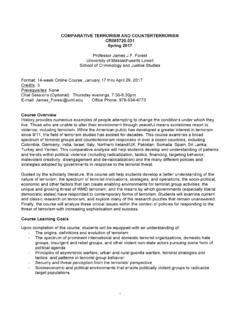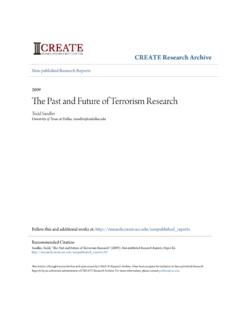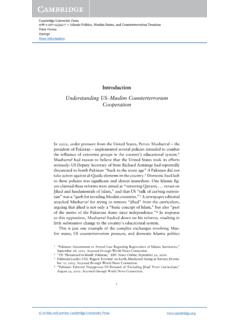Transcription of POLS/AJ 370: Terrorism and Counterterrorism, Spring 2010
1 POLS/AJ 370 Terrorism YoungPOLS/AJ 370: Terrorism and counterterrorism , Spring 2010 Departments of Political Science and Criminology & Criminal JusticeSouthern Illinois University1 Instructor InformationDr. Joseph K. YoungPhone: Grant FANER 3178 Office Hours: 10:00 AM-1:00 PM T/THClass Location: AG 0102 Course Time: 2:00-3:152 Course DescriptionThis course introduces students to the study of Terrorism as a political act. We discuss the differ-ence between state and oppositional terror, but the bulk of the course focuses on terror by non-stateactors. We will compare different theories that attempt to explain why, how and when the oppo-sition uses terror tactics to pursue their goals. Different research strategies of studying terrorismwill be considered throughout with emphasis placed on developing a project related to increasingscholarly understanding of Terrorism .
2 This course focuses less on substantive examples of terrorismthan on theories that can help explain Terrorism . We conclude by examining the ways that statescounter terror, and the choices and the tradeoffs states face when confronting Course ObjectivesI have three main objectives for this course. First, my goal is to introduce you to important theoriesand concepts related to the study of Terrorism . Second, since many students have limited exposureto important cases of Terrorism , we investigate several prominent historical and contemporarycases of oppositional and state Terrorism . Third, students will develop the basic skills necessary toproduce original research on Course FormatThe course is structured to consider various theoretical approaches to the study of Terrorism . Assuch, we consult a variety of sources from disciplines such as political science, sociology, psychology,criminology, anthropology, and believe strongly that learning occurs in many ways and strive to engage you beyond simply lectur-ing.
3 Instead, we will engage in a variety of activities including lectures, personal writing exercises,partner and group work, class discussions, video clips, demonstrations, problem-solving activities,simulations, debates, and other critical thinking exercises. I also firmly believe in democracy andwill solicit your opinions regarding the course generally, and the success or failure of certain exer-cises specifically. This course will require a great deal of reading and participation on your part. Ifyou are not prepared each day and do not engage in the discussions, debates, and other activities,you will not be 370 Terrorism Young5 RequirementsRequired Books1. Hoffman, Bruce. TerrorismNew York: Columbia University Press. 9/11 Commission Report. 2004. New York: Norton. ISBN , Laura and Sharon Spray. and Writing in InternationalRelationsNew York: Pearson Longman.
4 ISBN 0-321-27766-X2. Enders, Walter and Todd Political Economy of TerrorismNew York: CambridgeUniversity Press. ISBN Horgan, John. Psychology of TerrorismNew York: Juergensmeyer, Mark. in the Mind of GodBerkeley: University of Nacos, Brigitte. and CounterterrorismNew York: Pearson Ross, Jeffrey Ian. Terrorism : An Interdisciplinary ApproachNew York: Sageman, Marc. Terror NetworksPhiladelphia: Penn University required books are available at the bookstore and 9/11 Commission reportisavailable for free as a PDF on the Internet. You can find all of the books on at a reduced of the articles for the class will be on reserve at the library. You can also find most of thejournal articles on JSTOR ( ). I will also place readings on blackboard that are notavailable on JSTOR, and these are noted in the syllabus (*).
5 I expect you to read a newspapereveryday. You can choose any paper you would like, but I would recommend the New York Times( ) or Christian Science Monitor ( ) as they generally have thebest coverage of international and Participation (25%) attendance and participation are required. I maycall on you randomly so you need to be prepared each day. Each day you will receive a pointfor showing up and one for (50%) The tests are a mixture of multiple choice and essay. There is one midtermexam and a final. The final is Paper (25%) The first goal of this paper is to produce an original argumentexplaining the use of terror by a particular group and how to combat it given the theoreticaljustification for the group s goals. The second goal is to improve your written communication2 POLS/AJ 370 Terrorism Youngskills and thus to produce a paper of the highest quality.
6 In the past, students have usedthis paper as a writing sample for graduate or professional schools. We will participate in aseries of writing workshops that will guide you through the writing process. Each workshoprequires that you bring a portion of your paper as we build towards producing a final paper must be between 10 and 12 pages (not including a title or works cited page). Theformat must be Times New Roman font, 12 pt, 1 inch margins. A rough draft is due onFriday, March 5th (before Spring break). I will return the drafts with comments by Tuesday,March 16th. The rough drafts are worth 20% of the final grade, however; if you do not turnin a rough draft, I will not grade your final draft. I grade the papers using a strict rubric(available on blackboard). Consult these documents before writing the ScaleA100-90 B89-80 C79-70 D69-60 F59 or below6 Course PoliciesMake-up Exams and AssignmentsUnexcused absences from exams will result in a 0 for the assignment.
7 I also DO NOT accept anylate papers. The paper is due in hard copy on the date assigned by the time the class begins or thestudent earns a 0 for the qualify for a make-up test a student must notify me of the absence in advance (e-mail or callme) and provide are due at the beginning of the class on the date indicated in the schedule. I will notaccept e-mail copies or papers placed under my door. Please make hard copies of your papersasyou work on them. Do not be afraid to print out multiple rough drafts. I do not accept excusesabout dogs, computers, or traffic. Be Honor CodeStudents are expected to uphold the Academic Honor Code published in Southern Illi-nois University-Carbondale s Student Conduct Code (Section II, Article A). Plagiarismis the most serious academic offense. Violations of this code can lead to failure ofthe course and a hearing with the university s judicial board to suspend you from 370 Terrorism YoungClassroom CourtesyClassroom courtesy is an essential component of creating an effective learning environment.
8 Allstudents have the right to learn without unnecessary distractions. These distractions include: cellphones, talking during lectures (unless recognized by the instructor), reading newspapers, fallingasleep, etc. If you need a cell phone for emergency purposes, leave it on vibrate. Entering andleaving are also significant sources of distraction. It is your responsibility to be on time and to stayfor the entire period. In circumstances where you need to leave early, tell the instructor disruptions of class will lead to a reduction in your final importantly, class discussions of the issues in political science and criminology, especially asthey relate to Terrorism , can lead to strong feelings and heated debate. Because this is a collegeclassroom, all discussion must be respectful and Comments are respectful of diverse opinions and open to follow up questions and/or disagreement are related to class and/or the course material focus on advancing the discussion about issues related to the course and/or course materialrather than personal beliefs, and are delivered in normal tones and a non-aggressive Comments are personal in nature.
9 This includes attacks on a persons appearance, demeanor, or politicalbeliefs. include interrupting the instructor or other students. Raise your hand and wait to be recog-nized. often use the discussion to argue for political positions and/or beliefs. If political discussionsarise, they must be discussed in a scholarly way (see above). may include using raised tones, yelling, engaging in arguments with other students and beingthreatening in any manner. include ignoring the instructors authority to maintain the integrity of the classroom Change PolicyThis syllabus is a guide for the course and is subject to change with advanced notice. Thesechanges may come via e-mail. Make sure to check your university supplied email regularly. Youare accountable for all such 370 Terrorism Young7 TentativeCourse ScheduleWhat is Terrorism ?
10 Tues. Jan. 19 Introductions, Syllabus, ProceduresThurs. Jan. 21 Defining Terrorism -*Ross, Jeffrey. Introducing Oppositional Terrorism . Chapter 1 inPolitical Terror-ism: An Interdisciplinary Approach. pp. , Bruce. Chapter Jan. 26 What Terrorism is Not-*Stohl, Michael. 1983. Demystifying Terrorism : The Myths and Realities of Con-temporary Political Terrorism , in M. Stohl (ed.)The Politics of Terrorism , SecondEdition: Revised and Expanded. Marcel Dekker, pp. *Lafree, Gary and Laura Dugan. How Does Studying Terrorism Compare to StudyingCrime? Different Approaches to Understanding TerrorismThurs. Jan. 28 The Rationalist Approach to Understanding Terror-David Lake. 2002. Rational Extremism: Understanding Terrorism in the TwentyFirst Century. International Organization56 (1): *Crenshaw, Martha.



